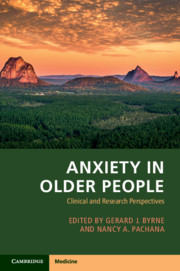Book contents
- Anxiety in Older People
- Anxiety in Older People
- Copyright page
- Contents
- Contributors
- Chapter 1 Introduction and Conceptual Overview
- Chapter 2 Epidemiology, Risk and Protective Factors
- Chapter 3 Diagnosis of Anxiety Disorders in Older Adults
- Chapter 4 Subthreshold Anxiety in Later Life
- Chapter 5 Cross-cultural Issues in Late-Life Anxiety
- Chapter 6 Clinical Assessment of Late-Life Anxiety
- Chapter 7 Late-Life Anxiety and Comorbid Depression
- Chapter 8 Anxiety and Cognitive Functioning
- Chapter 9 Anxiety in Parkinson’s Disease
- Chapter 10 Anxiety in Older Adults across Care Settings
- Chapter 11 Psychosocial Treatment of Anxiety in Later Life
- Chapter 12 Pharmacological Treatment of Anxiety in Later Life
- Chapter 13 Animal Models in Anxiety Research
- Chapter 14 Late-Life Anxiety
- Index
- References
Chapter 8 - Anxiety and Cognitive Functioning
Published online by Cambridge University Press: 08 March 2021
- Anxiety in Older People
- Anxiety in Older People
- Copyright page
- Contents
- Contributors
- Chapter 1 Introduction and Conceptual Overview
- Chapter 2 Epidemiology, Risk and Protective Factors
- Chapter 3 Diagnosis of Anxiety Disorders in Older Adults
- Chapter 4 Subthreshold Anxiety in Later Life
- Chapter 5 Cross-cultural Issues in Late-Life Anxiety
- Chapter 6 Clinical Assessment of Late-Life Anxiety
- Chapter 7 Late-Life Anxiety and Comorbid Depression
- Chapter 8 Anxiety and Cognitive Functioning
- Chapter 9 Anxiety in Parkinson’s Disease
- Chapter 10 Anxiety in Older Adults across Care Settings
- Chapter 11 Psychosocial Treatment of Anxiety in Later Life
- Chapter 12 Pharmacological Treatment of Anxiety in Later Life
- Chapter 13 Animal Models in Anxiety Research
- Chapter 14 Late-Life Anxiety
- Index
- References
Summary
The past decade has witnessed a proliferation of studies examining anxiety in older populations. This research underscores how anxiety is not just an ancillary symptom of depression, but a clinical issue on its own. Not only does anxiety cause suffering in older adults, but anxious older adults also have more functional disability (Brenes et al., 2005) and a reduced quality of life (Wetherell et al., 2004) compared to non-anxious older adults. In conditions that are common in later life (i.e., poor physical health, depression), those older adults experiencing comorbid anxiety typically have greater disability compared to non-anxious adults with these conditions. Cognitive functioning and the presence of neurocognitive disorders are aspects of comorbidity that have garnered increasing research attention (Beaudreau & O’Hara, 2008). This exciting new research underscores the complexity of the relations between anxiety and cognitive functioning in older individuals.
- Type
- Chapter
- Information
- Anxiety in Older PeopleClinical and Research Perspectives, pp. 117 - 138Publisher: Cambridge University PressPrint publication year: 2021
References
- 3
- Cited by

